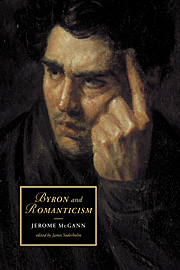Book contents
- Frontmatter
- Contents
- Acknowledgments
- General analytical and historical introduction
- PART I
- 1 Milton and Byron
- 2 Byron, mobility, and the poetics of historical ventriloquism
- 3 “My brain is feminine”: Byron and the poetry of deception
- 4 What difference do the circumstances of publication make to the interpretation of a literary work?
- 5 Byron and the anonymous lyric
- 6 Private poetry, public deception
- 7 Hero with a thousand faces: the rhetoric of Byronism
- 8 Byron and the lyric of sensibility
- 9 Byron and Wordsworth
- PART II
- Subject index
- Authors index
- CAMBRIDGE STUDIES IN ROMANTICISM
- References
2 - Byron, mobility, and the poetics of historical ventriloquism
Published online by Cambridge University Press: 22 September 2009
- Frontmatter
- Contents
- Acknowledgments
- General analytical and historical introduction
- PART I
- 1 Milton and Byron
- 2 Byron, mobility, and the poetics of historical ventriloquism
- 3 “My brain is feminine”: Byron and the poetry of deception
- 4 What difference do the circumstances of publication make to the interpretation of a literary work?
- 5 Byron and the anonymous lyric
- 6 Private poetry, public deception
- 7 Hero with a thousand faces: the rhetoric of Byronism
- 8 Byron and the lyric of sensibility
- 9 Byron and Wordsworth
- PART II
- Subject index
- Authors index
- CAMBRIDGE STUDIES IN ROMANTICISM
- References
Summary
Byron's popularity – the fact that he was a bestseller and “famous in [this] time” – has always focused certain literary problems, not least of all, at the outset, for Byron himself. “Lord Byron cuts a figure – but he is not figurative” (67), Keats waspishly observed in a letter to the George Keatses. This is an envious and illuminating remark which reveals as much about Keats and his ambitions for a successful career as it does about the character of Byron's verse, the phenomenon of Byronism, and the changing structure of the institution of letters at the beginning of the nineteenth century. Later writers have sometimes condescended to Byron, particularly to the Byron of the pre-exilic period, as a factitious writer who had merely seized the main chance during the Years of Fame. Of course it is true that he was himself largely responsible for creating the enormous popularity of the Oriental and Byronic Tales. Nevertheless – so the story goes – he cranked out verse between 1812 and 1815 to various formulas and audience expectations. In this activity he was not so much a poet as he was a pander and whore to public tastes. It passes without saying that those tastes were corrupt. (The non-malicious version of this general view is that Byron invented the myth of himself as The Romantic Poet, thereby creating a new structure of authorship which answered to the changing conditions that were rapidly transforming the English literary institution.
- Type
- Chapter
- Information
- Byron and Romanticism , pp. 36 - 52Publisher: Cambridge University PressPrint publication year: 2002
References
- 3
- Cited by

